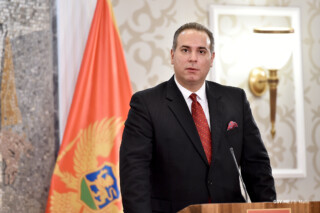Establishment of orthodox church without national symbol wouldn’t solve the issue of division of orthodox people in Montenegro, says in the interview for Pobjeda, Dr Radovan Radonjić.
President of Montenegro, Mr Milo Đukanović, offered a sort of platform for settling church issue. He thinks that church without national symbol would bring the division to an end. What’s your opinion about that initiative?
Dr Radonjić: First of all, just a couple of hypothetical notes. Judging by some indicators, the authorship of the document is collective rather than individual. It’s important to remember that.
Settling church issue in Montenegro as it was envisaged by the Proposal for the Law on Freedom of religion is impossible.
The story about orthodox Montenegro “without national symbol is shallow hoax perpetrated by Montenegrin supreme political and intellectual mind, a mind that has finally found the “religious way” of bringing Montenegro back to its Great Serbian spiritual and political cloak.
As far as my opinion about the president’s initiative is concerned, with all due respect for the president’s personality, I will say once again: We shouldn’t foster illusions: problems emanating from Serbian orthodox church will take on even sharper and more unpleasant form, until Montenegro regains its autocephalous church.
Could it be a spirit of animosity of a high Montenegrin and Yugoslav party functionary talking now?
Dr Radonjić: No. I am left-oriented, now more than ever. However, I always wanted people to believe what they chose to believe. This is a Montenegrin citizen talking now, and looking through the prism of the proposal for the law on freedom of religion, I don’t see very bright future.
Besides, there’s only one orthodox church in Montenegro that I really love. It’s the endowment of governor Radonjić and it’s less than three meters away from my house. I am proud of taking part in its reconstruction. I gave it part of my narrow garden just to make its garden wider. An somebody attributed that present to Serbian Orthodox Church, without my consent.
Why do you think that a church without national symbol wouldn’t bring divisions to an end?
Dr Radonjić: Take for example the character and activities of the Slovenian Church, the only church “with no national symbol”. In XII and XIII century, it would storm the Balkans more than any group of bandits.
It did not fight against Greek or Latin influence in order to protect “Slovenianness” but to protect its own right to take part in looting crusades and trade white slaves “acquired” in Bosnia and elsewhere. All this was written in the books we have to believe. This church has acquired all the necessary skills thanks to its sisters from the other side if Greenwich.
Let me answer your question.
There are several reasons why I believe that church in Montenegro, with or without a national symbol, can’t be solution to the division problem.
Reason number one. No church, or religious organization or any association of that kind is a creation of God. It’s human creation. None of them deals with religious issues.
Reason number two. In Christianity in general, and in its eastern orthodox fraction, there is no religious disunity or inequality. There is a difference between eastern and western christian church regarding the interpretation of the Article 8, the so called dogme filloque. The so called Nicene belief, saying that “Saint Spirit” comes from the God, was complemented with a belief that “Saint Spirit” emanates from the God and from the Son. There are no other differences among Christian churches. The fact that eastern and western Christian church are organized differently is a technical thing.
Reason number three. The equality of believers cannot be jeopardized, in the sense of their capability to find their path towards God on their own. If I am a believer I will not allow anybody undermine my faith. Otherwise, I inevitably become victim of manipulations.
Reason number four. The church problem in Montenegro is not of religious nature. That problem is political and national. All this is about conflicts among political ambitions.
Heads of two orthodox churches, Montenegrin Orthodox Church and Serbian Orthodox Church, dismissed this idea. Do you think it’s possible that they will change their mind?
Dr Radonjić: If worldly rulers say so, yes. The problem lies in the nature of what worldly rulers ask from the priests. For example, insisting on tomos as some sort of autocephaly certificate, Not only is that unnecessary, but it serves to political and other manipulations. If orthodoxy is democratic and free from patterns, then it will allow its followers have their own independent church in every country.
Montenegrin Orthodox Church and Serbian Orthodox Church are exponents of two completely opposed systems of values. Is there any chance of reconciliation?
Dr Radonjić: Until 1993, value systems of the two churches were very similar. Whoever tries to use political and state ideology of Petrović family cannot be a real and honest friend of Montenegro.




